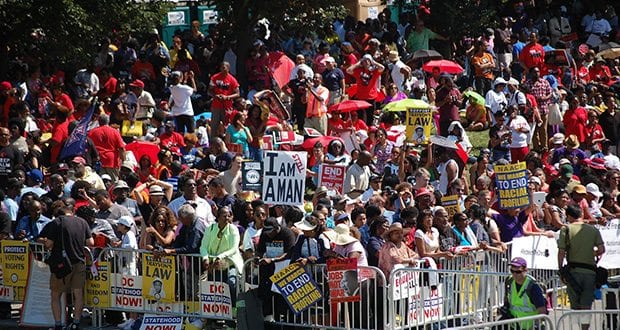

Harvard Law Professor Charles Ogletree spoke during the celebrations in Washington and mentioned his grandchildren as heirs to Dr. Martin Luther King Jrs. legacy. (Angela J. Davis photo)
Hours before buses left for the 50th anniversary of the March on Washington, youth members of the Boston NAACP’s Pipeline to Leadership program stood outside the Mall of Roxbury cheering and waving posters.
For many, this trip would be their first to the nation’s capital. Nearly 300 people would join them on the journey and in their excitement.
For some present it was a rite of passage to be a part of the 50th anniversary because of their vivid memories of the original in 1963. For others it would be a chance to be a part of history in the making.
“I feel like there’s this kind of attitude in the country that we live in a post-racial society and it’s totally not true,” said Jimmy Meade, 24, of Dorchester. “Trayvon Martin isn’t the only example but it was sort of like a flashpoint of exposing the continuing systemic and cultural racism that still exists today. So I’m here to march and basically protest that.”
Marian Styles of Providence echoed those sentiments. “I came to march for the issues that are facing us, like jobs and especially voting rights, racial profiling, freedom, equality and education — some of the same things we were marching for 50 years ago,” said Styles. “There have been some changes, yes, but we have a long, long way to go. It’s surprising now that we have folks trying to take us back to where we were before, especially with voting rights.”

Author: Tayla AndreThousands gathered around the Reflection Pool to commemorate the March on Washington’s 50th anniversary.
Once in Washington, D.C., all eyes turned to the podium on the steps of the Lincoln Memorial. Noted speakers and dignitaries sat nearby as some awaited their turn to deliver remarks. Historical giants, both past and present, were applauded by very vocal attendees.
Speakers included Gov. Deval Patrick, Rev. Al Sharpton, Rev. Jesse Jackson, U.S. Attorney General Eric Holder, U.S. Rep. Nancy Pelosi, U.S. Rep. Marcia Fudge, Mayor of Newark, N.J., Cory Booker, Medgar Evers’ widow Myrlie Evers-Williams, Martin Luther King III, journalist Roland Martin, political analyst Michael Eric Dyson and Trayvon Martin’s parents. The famed civil rights activists C.T. Vivian and Rep. John Lewis, the youngest speaker at the 1963 march, were among some of the most revered and received standing ovations.
“The dream still has demands and hope still needs heroes,” said a passionate Booker.
“He had a dream, we need a team,” Dyson chanted repeatedly throughout his speech.
“This struggle must, and will, go on in the cause of our nation’s quest for justice — until every eligible American has the chance to exercise his or her right to vote unencumbered by discriminatory or unneeded procedures, rules or practices,” said Holder emphatically.

Author: Tayla AndreGroups such as the NAACP played a big part in the recent 50th anniversary of the March on Washington. (Tayla Andre photo)
“Everything has changed and nothing has changed,” Sharpton exclaimed.
Carrying signs that read “Inequality equals insecurity for all” and “50 years, but the dream still eludes us” husband and wife John and Marion Lathrop were joining the march for a second time. “There were a lot more white people in ’63. So many people are de-polarized instead of working to solve problems,” said Marion Lathrop, 77, of Worchester. “Things have only changed somewhat.”
Many of the youths who traveled to the march with the Boston NAACP chapter expressed enjoyment and a heightened sense of awareness after attending the march.
“I thought it was a great historic moment. I’m 21 and this happened 50 years ago so I wanted to relive what my ancestors did. I wanted to be a part of history and I’m glad I came,” said Azya High, 21, of Lynn.
“I really wanted the chance to be a part of this new part of history. It was invigorating and inspiring,” said Kemper English, 21, of Cambridge.






